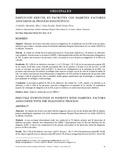| dc.rights.license | http://creativecommons.org/licenses/by-nc-sa/3.0/ve/ | es_VE |
| dc.contributor.author | Montañez, Cristhofer | |
| dc.contributor.author | Salas P., Alba J. | |
| dc.contributor.author | Gómez Pérez, Roald | |
| dc.date.accessioned | 2025-03-20T12:20:44Z | |
| dc.date.available | 2025-03-20T12:20:44Z | |
| dc.date.issued | 2025-03-20 | |
| dc.identifier.issn | 1690-3110 | |
| dc.identifier.uri | http://www.saber.ula.ve/handle/123456789/51481 | |
| dc.description.abstract | Objetivo: Examinar los factores asociados al proceso diagnóstico de la disfunción eréctil (DE) en los pacientes
diabéticos que acuden a consulta externa del Instituto Autónomo Hospital Universitario de Los Andes (IAHULA)
en Mérida, Venezuela.
Método: Se realizó un estudio observacional transversal en 70 pacientes diabéticos y 38 médicos de diferentes
especialidades. A los pacientes se les aplicó el IIEFQ-5 (International Index of Erectile Function) para el diagnóstico
de DE. Se aplicó una encuesta a los pacientes y otra a los médicos acerca del proceso diagnóstico de la DE en la
consulta.
Resultados: El 12,8% de los diabéticos eran tipo 1 y el 87,1% tipo 2. El 71,4% de los pacientes presentaron DE,
de los sujetos de 60 años o más el 86,6% presentaron DE y de los menores a 60 años el 61,2% (p<0,05). La DE
severa se relacionó con mayor edad (p<0,001). Se observó un subdiagnóstico de la patología en un 90%. Los
pacientes expresaron que los médicos no indagan sobre aspectos sexuales a pesar de estar de acuerdo en hablar de
ello. Los médicos piensan que los problemas para el diagnóstico de DE son falta de disposición del paciente, falta
de tiempo y falta de preparación sobre sexualidad. Ambos grupos manifestaron que la patología es competencia
principalmente de urología y endocrinología.
Conclusión: La prevalencia global de DE en los diabéticos del estudio fue 71,4%, similar a lo señalado en la
literatura, y solo el 10% de los pacientes conocían el diagnóstico al momento de la consulta. Es mandatorio
mejorar las estrategias de diagnóstico de la DE, en pro de satisfacer la salud sexual del paciente diabético.
Recibido: noviembre 2024 - Aceptado: enero 2025 | es_VE |
| dc.language.iso | es | es_VE |
| dc.publisher | SaberULA | es_VE |
| dc.rights | info:eu-repo/semantics/openAccess | es_VE |
| dc.subject | Diabetes | es_VE |
| dc.subject | Disfunción eréctil | es_VE |
| dc.subject | IIEFQ-5 | es_VE |
| dc.title | Disfunción eréctil en pacientes con diabetes. Factores asociados al proceso diagnóstico | es_VE |
| dc.title.alternative | Erectile dysfunciont in patients with diabetes. Factors associated with the diagnostic process | es_VE |
| dc.type | info:eu-repo/semantics/article | es_VE |
| dcterms.dateAccepted | enero 2025 | |
| dcterms.dateSubmitted | octubre 2024 | |
| dc.description.abstract1 | Objective: To examine the factors associated with the diagnostic process of erectile dysfunction (ED) in diabetic
patients attending the outpatient clinic of the Instituto Autónomo Hospital Universitario de Los Andes (IAHULA)
in Mérida, Venezuela.
Methods: A cross-sectional observational study was conducted in 70 diabetic patients and 38 physicians of
different specialties. Patients were administered the IIEFQ-5 (International Index of Erectile Function) for the
diagnosis of ED. A survey was administered to the patients and another to the physicians about the diagnostic
process of ED in the office.
Results: The 12.8% of the diabetics were type 1 and 87.1% type 2. The 71.4% of the patients presented ED, 86.6%
of the subjects aged 60 years or older presented ED and 61.2% of those younger than 60 years (p<0.05). Severe ED
was related to older age (p<0.001). Underdiagnosis of the pathology was observed in 90%. Patients expressed that
physicians do not inquire about sexual aspects even though they agree to talk about it. The physicians think that
the problems for the diagnosis of ED are lack of willingness of the patient, lack of time and lack of preparation on
sexuality. Both groups stated that the pathology is mainly the competence of urology and endocrinology.
Conclusion: The overall prevalence of ED in diabetics in the study was 71.4%, similar to that reported in the
literature, and only 10% of patients knew the diagnosis at the time of consultation. It is mandatory to improve
strategies for the diagnosis of ED in order to improve the sexual health of diabetic patients. | es_VE |
| dc.description.colacion | 16-25 | es_VE |
| dc.description.email | rvdeme@gmail.com | es_VE |
| dc.description.email | cristhoferpostgradoivss@gmail.com | es_VE |
| dc.description.frecuencia | Cuatrimestral | |
| dc.description.paginaweb | http://www.saber.ula.ve/rvem/ | |
| dc.identifier.depositolegal | ppi. 200902ME4351 | |
| dc.publisher.pais | Venezuela | es_VE |
| dc.subject.institucion | Universidad de Los Andes | es_VE |
| dc.subject.keywords | Diabetes | es_VE |
| dc.subject.keywords | Erectile dysfunction | es_VE |
| dc.subject.keywords | IIEFQ-5 | es_VE |
| dc.subject.seccion | Revista Venezolana de Endocrinología y Metabolismo: Originales | es_VE |
| dc.subject.tipo | Artículos | es_VE |
| dc.type.media | Texto | es_VE |


